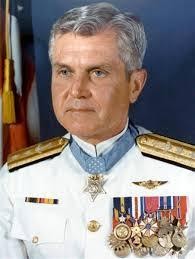
In the final days of his study at Stanford University, James Stockdale was presented with a text called the Enchiridion, written by the Stoic philosopher Epictetus. What may have appeared at first to be the theoretical musings of a long dead man, later became the source of Stockdale’s survival.
Shortly after his deployment in the Vietnam War, Stockdale’s plane was shot down and he faced years of imprisonment and torture. Despite the unimaginable hardships he endured, the words of Epictetus remained by his side at all times. Acceptance, perseverance and self-control were the key Stoic teachings that kept him alive.
Stockdale’s Imprisonment
James Bond Stockdale (1923 – 2005) was a senior officer and pilot for the United States Navy. He fought during the Vietnam War and was bestowed with many awards, including the Medal of Honor. On 9 September 1965, Stockdale´s plane was hit and he parachute jumped, before being taken prisoner for more than seven years in the Hỏa Lò Prison, also known as the Hanoi Hilton, where he was constantly beaten and tortured.
He had broken a leg during his capture, which was never treated and repeatedly broken over the subsequent years. That is just one example of the pain and suffering he endured. However, as the senior officer among his fellow prisoners, Stockdale was responsible for the group’s survival, along with his own. In 1973, Stockdale was finally set free during Operation Homecoming.
How Stoicism Saved Him
James Stockdale was a man of action, born well past the time of the great philosophers. It seemed that philosophy had become a practice restricted to men of books, and therefore inaccessible to the average person. Stockdale proved this misconception wrong.
Stockdale was exposed to Stoic philosophy by chance, when a professor at Stanford University gifted him a copy of Epictetus’ Enchiridion. He became enthralled and managed to memorise most of Epictetus’ philosophies before the outbreak of the Vietnam War.
“Epictetus said: ‘Men, the lecture room of the philosopher is a hospital; students ought not to walk out of it in pleasure, but in pain.’ If Epictetus’ lecture room was a hospital, my prison was a laboratory – a laboratory of human behavior. I chose to test his postulates against real life challenges of my laboratory. And as you can tell, I think he passed with flying colors.”
James Stockdale
Stockdale’s admiration for the ancient philosopher only grew during his time in captivity, as Epictetus became Stockdale’s closest friend and mentor during this time. Stockdale used his teachings on Stoicism as a survival strategy, which allowed him to endure his harsh conditions. In Stockdale’s biography, he mentioned that every moment in captivity was spent with Epictetus: “He was there with me the whole time.”
The Stockdale Paradox
Despite the conditions Stockdale had to face, when he was back in the States, he said: “I never lost faith in the end of the story, I never doubted not only that I would get out, but also that I would prevail in the end and turn the experience into the defining event of my life, which in retrospect, I would not trade.”
When asked about the ones who didn’t survive, he replied: “Oh, that’s easy. The optimists.” According to Stockdale, the optimists set goals that were too high and would naturally be disappointed when those goals didn’t come to pass. “They were the ones who said, ‘we’re going to be out by Christmas.’ And Christmas would come, and Christmas would go” and nothing had changed.
That sequence of disappointments resulted in them losing faith completely, because they were counting on events that were beyond their control. If you are familiar with Stoicism, you would know that understanding what is in our control and what is outside our control is the most important thing to be aware of.
Stockdale took responsibility for his survival and that of his men, and he remained faithful and pragmatic while doing so, but he didn’t surrender to blind optimism. His motto was to hope for the best and prepare for the worst, which has become the main idea behind the Stockdale Paradox.
However, the Stockdale Paradox wasn’t coined by Stockdale himself; it was developed by James C. Collins after he interviewed Stockdale. He then wrote a book called Good to Great: Why some companies make the leap and others don’t. In his book, Collins develops his concept of the paradox to show how discipline and transformative leadership can bring a company to success. The paradox relies on maintaining the balance between realism and optimism.
In Stockdale’s case, discipline, realism, acceptance and a sense of purpose did not bring a company to success, but it did keep men alive for years until their rescue. His ability to not waste energy trying to control what was outside of his power, while also maintaining a healthy sense of optimism, was what allowed him to help himself and his men through their capture. Of course, it is important to remember the core guidelines of this paradox originated in the Stoic philosophies of Epictetus.










